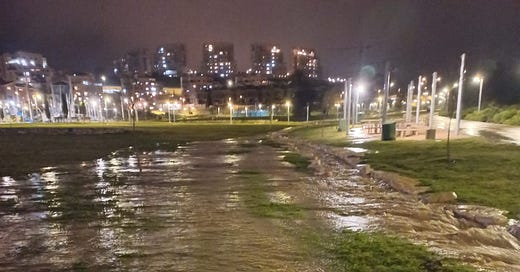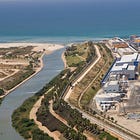Dear Healthy Jew,
Israel’s political and security situations remain snarled. And our neighbors in Turkey and Syria were rocked this week by a tragic, devastating earthquake.
But Israel is no longer under drought, as I reported it was two weeks ago:
Heavy rains began already last week. This week they turned torrential, in the higher altitudes falling as sleet and snow. The current storm, which blew over from southern Europe, even has a name, Barbara. But rainwater has been flowing through the local Yarmut Stream for thousands of years, as attested to by the numerous archeological finds along the stream’s route that span many historical periods - from the Canaanites to the Byzantines.
Take a closer look here, right under my apartment in Ramat Bet Shemesh:
The Bet Shemesh municipality built a pretty stone bed for the Yarmut. But when the storms rage, the stream invades its namesake Yarmut park, as you can see here:
Crossing the stormy Yarmut might not be as miraculous as the Jordan, but nevertheless it can be a muddy experience:
Now, I’ve heard back from a bunch of Healthy Jews that the present rains must be God’s response to my column. They were joking, of course - but, on second thought, were they?
We discussed the biblical principle that rain and drought in Israel are God’s responses to its people’s spiritual health. When the Jewish nation join forces with the land to receive life from above, God in turn rains down plentiful blessings from heaven. But when they detach from the natural world and, instead, extort life with their own power and self-reliance, the sky remains blue in January. The solution, we saw, is to turn inwards in reflection, repentance, and prayer, returning to the larger life of God’s world. This, in fact, was the purpose of drought and other troubles: to invite us to change. When we hearken to the call, rain falls, both literally and as the archetype for God’s blessing of livelihood to the entire world.
So maybe the rain is indeed falling because Healthy Jews reflected, repented and prayed?
There are two reasons to reject this theory. The first is that the whole thing is a nice idea, but come on, it’s not for real.
That’s possible, but to whatever degree the Torah is authentic and relevant, it’s gonna also be for real. (Quick update: hail is falling outside my window.) Debating the degree of the Torah’s authenticity and relevance lies beyond Healthy Jew’s purview (and anyways, I’m not much of a debater), so we’re going to leave this question open.
A more pressing problem, in my view, is that not every Israeli reads Healthy Jew, at least not yet. For rain to fall on the entire country because of its people’s spiritual health, shouldn’t that need a larger society-wide movement, à la Jonah in Nineveh? Isn’t it pretentious for our little corner of the internet to take credit for the world’s health?
To put things into perspective, let’s briefly discuss a dreadfully important principle explained by Maimonides in the third chapter of his Laws of Repentance. Every individual person’s moral decisions, Maimonides taught, are divided into three parts: the individual, the citizen of a country, and the citizen of the world. Hear the profound nuance: individuals’ choices don’t just affect the community and world; they are the choices of their portion of the community and world. Therefore, as Maimonides continues, reward and punishment are returned to these three levels: the individual, the community, and the world. (I’m sure we’ll return to this rule one day in more detail.)
So when rain falls or doesn’t fall on Israel - both literally and archetypically - God is messaging the qualitative third of each citizen’s choices that together compose the Jewish nation. We don’t know the heavenly calculations behind each ruling for rain or drought; the possible combinations of millions of people’s right and wrong choices for just one day approaches infinity, and besides, moral analyses aren’t binary - good is plus, bad is minus - but impossibly intricate. But we can choose to believe that the Healthy Jews’ hearkening to the drought’s message play their small but countrywide part in bringing rain and blessing to all of Israel.
Food for Thought: Can you see the triad of choices in every decision you make - yourself, your community, and the world? How might that affect the way you live, and how you respond to community and world events?
Thank you for reading Healthy Jew.
Here are 2 great paths to continue the journey:
Also check out this intro and index to explore hundreds of posts about our 3 Healthy Jew topics: Wellness with Wisdom, Land of Life (Israel), and Sensible Spirituality.
Finally, always feel free to reach out here with any comments, questions, or complaints:
I look forward to hearing from you!
Be well,
Rabbi Shmuel Chaim Naiman
Please note: All content published on Healthy Jew is for informational and educational purposes only. Talk to a qualified professional before taking any action or substance that you read about here.








